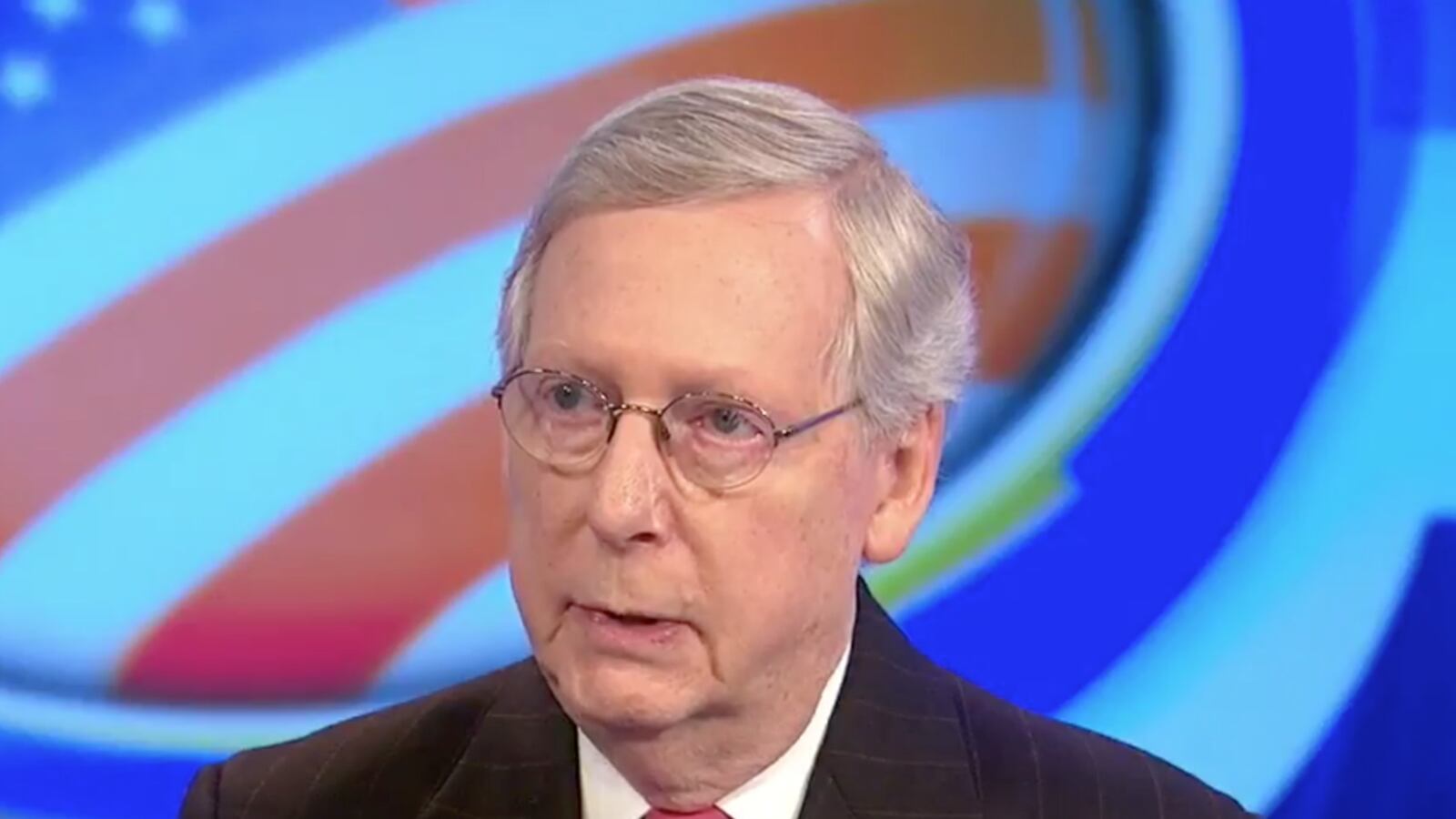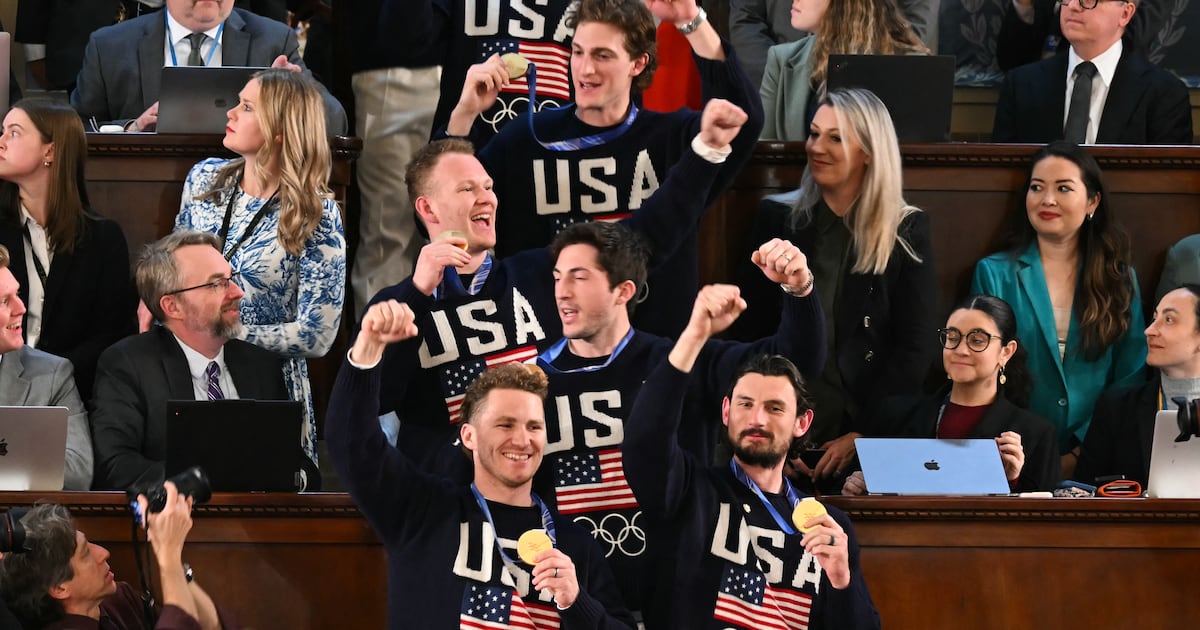Top Republican leaders have refused to criticize President Donald Trump’s sweeping executive order that temporarily bans natives of seven Muslim-majority countries from entry into the U.S., while others in the GOP are saying it could undermine America’s national security. Meanwhile, administration officials are sowing confusion about who exactly the order affects.
GOP members of Congress have largely supported the executive order, save for a handful of Republicans—many of whom never supported Trump’s candidacy in the first place. House Speaker Paul Ryan said on Friday that the president is “right to make sure we are doing everything possible to know exactly who is entering our country.” Ryan has yet speak publicly since then. On Sunday, Senate Majority Leader Mitch McConnell stopped short of criticizing the order.
“The president has a lot of latitude to try to secure the country, and I’m not going to make a blanket criticism of this effort,” McConnell said on ABC’s “This Week,” deferring to the courts for further review. “However I think it’s important to remember, as I’ve said, that a lot of Muslims are our best sources in the war against terror.”
McConnell added that “we need to be careful” with these orders so as to not impose a “religious test.” But that’s exactly what detractors are calling it, because it gives priority to religious minorities in the Muslim-majority countries. Democrats, who are dubbing the order a Muslim ban, pointed to Ryan’s and McConnell’s past criticisms of Trump after he called for a blanket ban on Muslims entering the U.S.
The GOP detractors include Reps. Barbara Comstock and Justin Amash, and Sens. John McCain, Lindsey Graham, Ben Sasse and Jeff Flake. Amash said banning green-card holders in particular is “troubling,” while Sasse called the executive order “too broad.”
McCain and Graham, who have not hesitated to condemn Trump when they disagree with the president, said Sunday in a statement that it was “clear from the confusion at our airports across the nation that President Trump’s executive order was not properly vetted.”
They added: “Ultimately, we fear this executive order will become a self-inflicted wound in the fight against terrorism. … This executive order sends a signal, intended or not, that America does not want Muslims into our country.”
White House Chief of Staff Reince Priebus defended the order, saying on Sunday that individuals who hold citizenship from the seven countries listed in the executive order and have valid green cards will not be barred from returning to the U.S. But as federal officials began to interpret the order, individuals who hold citizenship from one of those seven nations but have valid visas were either prevented from boarding flights to the U.S., or detained upon arrival at U.S. airports.
“The executive order doesn’t affect green-card holders moving forward,” Priebus said on NBC’s “Meet the Press.” He added that Customs and Border Protection agents have “discretionary authority” to give additional scrutiny to individuals traveling from the countries named in the executive order— Iran, Iraq, Libya, Somalia, Sudan, Syria and Yemen—“until a better system is put in place.”
As the order was taking effect nationwide, green-card holders and individuals with valid visas who hold citizenship from those seven countries were detained after arriving from overseas at John F. Kennedy International Airport in New York, Washington Dulles International Airport outside the nation’s capital and Los Angeles International Airport, among others.
A federal judge issued a ruling late Saturday that blocked deportation for people with valid visas who were being detained at airports. Kellyanne Conway, counselor to the president, said on Sunday the detentions of certain foreign nationals is “temporary” and “circumstantial,” and that the judge’s ruling does not affect the executive order.
“In terms of the upside being greater protection of our borders, of our people, it’s a small price to pay,” top White House adviser Kellyanne Conway said on “Fox News Sunday.” “I am told by the officials that anyone who has been detained—if there’s no further threat, if they’re not dangerous to this country—they can expect to be released in due course, as most of them have already.”
Amid the chaos and protests popping up at airports nationwide, the executive order was condemned as unconstitutional and poorly planned and implemented. The order also suspends the refugee program for 120 days, and the Syrian refugee program was suspended indefinitely. Those edicts have been largely overlooked since Friday as Democrats turn their attention to those who were detained at U.S. airports.
Iraqi translators who worked with the U.S. military and were set to soon arrive in the U.S. after being thoroughly vetted by intelligence agencies and granted visas were suddenly blocked.
In a statement Sunday, the Department of Homeland Security stood by the White House and said detainees are treated “humanely and with professionalism.” The statement added: “President Trump’s Executive Orders remain in place—prohibited travel will remain prohibited, and the U.S. government retains its right to revoke visas at any time if required for national security or public safety.”
The White House says Friday’s decree is not a religious test, claiming instead that the Trump administration is seeking to protect persecuted religious minorities. Trump himself said during an interview with the Christian Broadcasting Network that persecuted Christians will be prioritized.
“What we’re going to do is make sure that people who have been persecuted for either religious or other reasons have an opportunity to apply and go through a vetting system that ensures they’re coming to this country to seek asylum, to seek a new life for themselves or their family, but to do so with peaceful purposes,” White House Press Secretary Sean Spicer said on “This Week.”






